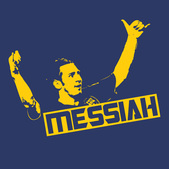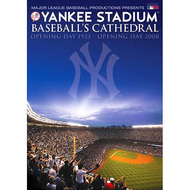
In this post I want to examine what the similarities are, but also suggest that it is a false dichotomy to suggest you must have one or the other.

Arguably the most obvious way that sport seems to be like religion is in the way that sport-stars like Messi, Bolt and McCaw are worshipped and adored by their fans. Having their names screamed by thousands, their names on the back of replica shirts and their images all over the media. They surely are as close to super-human as we can get! Some scholars believe that fans are highly committed to their favoured stars and teams in a way that gives focus and meaning to their daily lives (Barber).

Just as the Cathedrals and Abbeys were built in the Medieval era to demonstrate the prowess of a nation or ruler, the same could be said of modern stadia - "cathedrals [are] where followers gather to worship their heroes and pray for their successes."(Wann, et al., 2001, p. 200). You only need to think about the massive building projects that accompany modern Olympics or World Cups - Beijing 2008, London 2012 and Brazil 2014 have all seemingly tried to outdo each other. These building inspire awe and wonder in the modern era just as Cathedrals still have the power to do.
Rituals of Sport
Just as religious devotees do, so sport fans also wear ritualistic clothing, have special colours, wave flags, and sing anthems together. Individual sportsmen have odd customs too such as lucky socks, putting on their kit in a certain order and offering prayers before taking to the pitch.

Another obvious comparison with religion and what modern sport offers people today is a wonderful experience - Rudolf Otto defined the term ”Numinous” - the realisation of the divine and the wholly other. Many would argue that participation in sport or watching sport is the closest thing to this that many experience. Being a spectator can provide moments of elation and transcend ones everyday existence. This can be seen in negative terms - Sam Harris has suggested that sport is the new “opiate of the people” after Karl Marx’s critique of organised religion. But is it fair to suggest that sport is just escapism for the humdrum of everyday life?
Sense of Community and shared values
Sport also provides people with an instant community - people who love the same thing as each other and buy into the same values. The Rugby Football Union calls itself "the community game" and emphasises the shared values of Rugby which include fair-play, discipline and tolerance. In modern Britain it could be argued that the church used to provide these values but for many sport now fulfils this role.

Having discussed how sport might be seen as the new religion - I still personally have my doubts. Whilst sport has many of the features of religious practice this does not mean that it has replaced faith. In Britain and Western Europe it is true that religion has declined massively in recent decades and at the same time the interest in sport has hugely increased. This is however a western phenomenon and in many other parts of the world such as Eastern Europe, Russia and the Americas participation in religion has been massively increasing (Davie).
It is therefore not surprising that many sportsmen credit their successes to the divine and see their faith as integral to their sport - the Brazil football team prayed together throughout the World Cup (although it did not seem to help them against Germany! http://www.bbc.co.uk/sport/0/football/28202816). Some psychologists even argue that it could be advantageous to be religious and help improve the performance of athletes (http://www.bbc.co.uk/sport/0/olympics/18893284).
It is not only the competitors who are religious; “Sports fans are fairly religious” (Barber) and in research before the last Super-Bowl half of the fans believed that the supernatural has a role to play in the success of their team (http://publicreligion.org/research/2014/01/jan-2014-sports-poll/)
I am sure that over the next weeks as the Commonwealth games plays out you will see a number of religious acts; Athletes crossing themselves, offering a quiet prayer after success (e.g. Mo Farah) or thanking God publicly for their achievements. In my mind it does not need to be one or the other, this is a false dichotomy.
References
Is Sport a Religion? | Psychology Today, Nigel Barber, 2009 http://www.psychologytoday.com/blog/the-human-beast/200911/is-sport-religion
Sport fans: The psychology and social impact of spectators, Wann, D. L., Melznick, M. J., Russell, G. W., & Pease, D. G. New York: Routledge. 2001.
Sport is new opium of the people, Harris, S. J. (1981, November 3). Democrat and Chronicle, p. 3B.
Religion in Modern Europe, Grace Davie, OUP, 2000

 RSS Feed
RSS Feed
